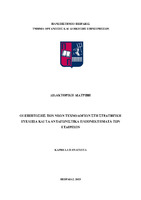Οι επιπτώσεις των νέων τεχνολογιών στη στρατηγική ευελιξία και τα ανταγωνιστικά πλεονεκτήματα των εταιρειών

View/
Keywords
Στρατηγικό μάνατζμεντ ; Ανταγωνιστικό πλεονέκτημα ; Εφοδιαστική αλυσίδα ; Στρατηγική ευελιξία ; Νέες τεχνολογίες ; Θεωρία κόστους συναλλαγών ; ΤΠΕ ; Υπολογιστικό νέφος ; Cloud computingAbstract
The views of the global research community regarding the role of Information Technology (IT) and the wider context of new technologies (Cloud, AI, IoT, BI) in strategic flexibility and the competitive advantages that come from their proper adoption are divided. This research seeks to analyse the contribution of new technologies in enhancing strategic flexibility resulting in competitive advantage. Strategic flexibility is imperative, especially in a competitive environment. However, there is still a gap in the literature regarding the effects of new technologies on the strategic flexibility of a supply chain firm, and in particular the role of strategic flexibility through new technologies.
So, after a thorough literature analysis and various case studies, the present research demonstrates the importance of a technologically developed, "autonomously" thinking chain, with low transaction costs, in which every trader will be able to participate fully and consciously. To achieve the objectives of the research, the case study of Company X was used, a company that operates in many countries worldwide in the transport sector and is an important member of a supply chain. The research concerned Company X in Greece and the Action Research method was used to examine it.
Company X using Information Systems Technologies, with state-of-the-art equipment, had significant benefits in both performance and cost reduction over a three-year period. From the results of the research, it was established the significant improvement of the efficiency of the employees from the adoption of Information Systems and New Technologies in Company X, as well as the great security it has in its Information Systems. The findings of this section clearly showed that technical support through New Information Systems Technologies can lead to a competitive advantage without being sustainable.
Minimal human intervention, complete absence of paperwork and support for volatile environment laid the foundations for a very different way of internal business operations.


